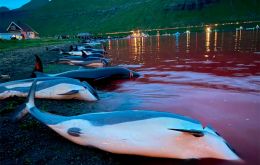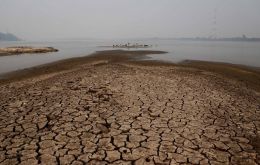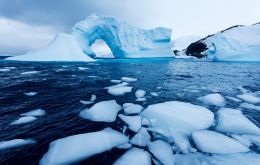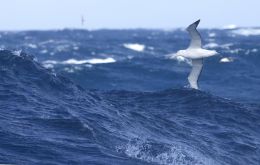MercoPress. South Atlantic News Agency
Environment
-
Monday, July 11th 2022 - 09:49 UTC
Faroe Islands limit traditional catch of dolphins to 500; 'barbaric practice' killed 1,423 last year

Faroe Islands announced on Sunday that the traditional catch of dolphins to be killed in its water would provisionally be limited to 500. The decision to crack down on the number of hunted dolphins comes after public outcry from last year's hunt, where over 1,423 white-sided dolphins were killed, a spree that shocked even residents who supported the practice.
-
Thursday, July 7th 2022 - 09:55 UTC
Illegal fishing: there are more than 350 foreign vessels operating in the South West Atlantic, expert says

Last Tuesday, 11 tons of squid were found in a Chinese flagged vessel that was captured by the Uruguayan Navy, after a chase that took place between Sunday night and early Monday morning.
-
Thursday, July 7th 2022 - 09:54 UTC
European Union gets tough on trade affecting “deforestation and forest degradation”

The European Council, the body that sets the political agenda of the European Union (EU), agreed on a proposal to limit the entry and trade of commodities where production has contributed to “deforestation or forest degradation” worldwide.
-
Wednesday, July 6th 2022 - 10:30 UTC
Argentina and Paraguay, wheat and soybean crops victims of ongoing drought

Drought is causing havoc in Argentina and Paraguay. Argentina’s wheat crop for the 2022/23 season is the most delayed in a decade, as a period of lack of rainfall and early frosts is forcing farmers to delay planting the winter crop.
-
Wednesday, July 6th 2022 - 09:55 UTC
South Georgia and South Sandwich Islands designated landmass Protected Areas

The Government of South Georgia & the South Sandwich Islands (GSGSSI) announced on Tuesday the designation of the entire landmass of South Georgia & the South Sandwich Islands (SGSSI) as Specially Protected Areas, fulfilling the commitment it made in the “Pathway to Protection”
-
Wednesday, July 6th 2022 - 09:45 UTC
BAS report, the Antarctic glaciers ice loss is “unprecedented”

Two crucial glaciers in West Antarctica may be losing ice faster than they have over the last 5,000 years, according to a new study published in June. The international team, led by the University of Maine and including British Antarctic Survey (BAS) geologist Dr Joanne Johnson, examined the history of Thwaites and Pine Island Glaciers in the West Antarctic Ice Sheet.
-
Friday, July 1st 2022 - 09:39 UTC
Penguins at most risk off South Africa after predator whales seize the area

A study released this week in the peer-reviewed African Journal of Marine Science, would show that killer orcas are behind the finding of eight white sharks dead off the coast of Gansbaai, in western South Africa in 2017.
-
Thursday, June 30th 2022 - 09:00 UTC
South Georgia: Yacht Charter to support wandering albatross surveys

In 2024, the Government of South Georgia & the South Sandwich Islands (GSGSSI) will be undertaking a census of wandering albatross on South Georgia alongside various complementary terrestrial monitoring activities. To support this, GSGSSI requires to charter a yacht. We invite operators to tender for the provision of this service.
-
Wednesday, June 29th 2022 - 10:07 UTC
United Nations “Ocean emergency” conference opens in Lisbon

With climate change, biodiversity loss and pollution exacting a devastating toll on the world’s ocean — critical to food security, economic growth, and the environment — the 2022 UN Ocean Conference opened in Lisbon, Portugal with a call for a new chapter of ocean action driven by science, technology and innovation.
-
Monday, June 27th 2022 - 08:37 UTC
Slain British reporter buried in Rio de Janeiro

British reporter Dom Phillips, who was murdered earlier this month while venturing into Amazonia to gather material for a book, has been laid to rest in Niterói, in the metropolitan region of Rio de Janeiro.
